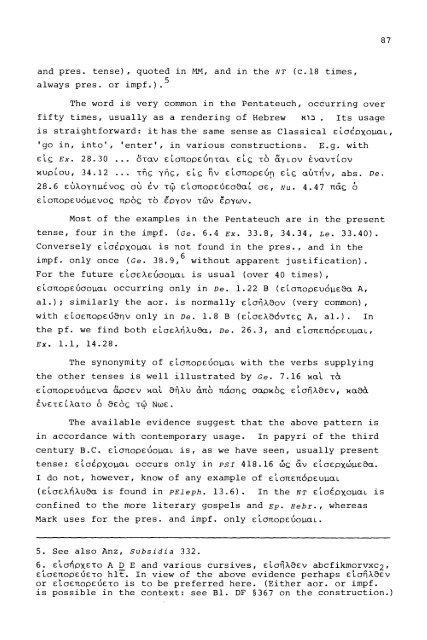A Lexical Study of the Septuagint Version of the Pentateuch
A Lexical Study of the Septuagint Version of the Pentateuch
A Lexical Study of the Septuagint Version of the Pentateuch
You also want an ePaper? Increase the reach of your titles
YUMPU automatically turns print PDFs into web optimized ePapers that Google loves.
and pres. tense), quoted in MM, and in <strong>the</strong> NT (c.18 times,<br />
always pres. or impf.).^<br />
The word is very common in <strong>the</strong> <strong>Pentateuch</strong>, occurring over<br />
fifty times, usually as a rendering <strong>of</strong> Hebrew ΚΊ3 . Its usage<br />
is straightforward: it has <strong>the</strong> same sense as Classical εισέρχομαι,<br />
'go in, into', 'enter', in various constructions. E.g. with<br />
εις Ex. 28.30 ... όταν είσπορεύηται εις το αγιον εναντίον<br />
κυρίου, 34.12 ... της γης, εις ην ε'ισπορεύη εις αυτήν, abs. De.<br />
28.6 ευλογημένος σύ έν τω είσπορεύεσθαί σε, Nu. 4.47 πάς ό<br />
είσπορευόμενος πρός τό έργον τών έργων.<br />
Most <strong>of</strong> <strong>the</strong> examples in <strong>the</strong> <strong>Pentateuch</strong> are in <strong>the</strong> present<br />
tense, four in <strong>the</strong> impf. (Ge. 6.4 EX. 33.8, 34.34, Le. 33.40).<br />
Conversely εισέρχομαι is not found in <strong>the</strong> pres., and in <strong>the</strong><br />
impf, only once (Ge. 38.9, 6<br />
without apparent justification).<br />
For <strong>the</strong> future ε'ισελεύσομαι is usual (over 40 times) ,<br />
είσπορεύσομαι occurring only in De. 1.2 2 Β (είσπορευόμεθα A,<br />
al.); similarly <strong>the</strong> aor. is normally είσήλθον (very common),<br />
with ε'ισεπορεύθην only in De. 1.8 Β (είσελθόντες A, al.). In<br />
<strong>the</strong> pf. we find both είσελήλυθα, De. 26.3, and εΊσπεπόρευμαι,<br />
Ex. 1.1, 14.28.<br />
The synonymity <strong>of</strong> ε'ισπορεύομαι with <strong>the</strong> verbs supplying<br />
<strong>the</strong> o<strong>the</strong>r tenses is well illustrated by Ge. 7.16 και τα<br />
ε ίσπορευόμενα αρσεν και θήλυ άπό πάσης σαρκός ε'ισήλθεν, καθά<br />
ένετείλατο ό θεός τώ Νωε.<br />
The available evidence suggest that <strong>the</strong> above pattern is<br />
in accordance with contemporary usage. In papyri <strong>of</strong> <strong>the</strong> third<br />
century B.C. ε'ισπορεύομαι is, as we have seen, usually present<br />
tense; εισέρχομαι occurs only in PSI 418.16 ως αν είσερχώμεθα.<br />
I do not, however, know <strong>of</strong> any example <strong>of</strong> είσπεπόρευμαι<br />
(είσελήλυθα is found in PEleph. 13.6). In <strong>the</strong> NT εισέρχομαι is<br />
confined to <strong>the</strong> more literary gospels and Ep. Hebr., whereas<br />
Mark uses for <strong>the</strong> pres. and impf, only ε'ισπορεύομαι.<br />
5. See also Anz, Subsidia 332.<br />
6. ε'ισήρχετο A D E and various cursives, ε'ισήλθεν abcf ikmorvxc2,<br />
εισεπορεύετο hit. In view <strong>of</strong> <strong>the</strong> above evidence perhaps ε'ισήλθεν<br />
or εισεπορεύετο is to be preferred here. (Ei<strong>the</strong>r aor. or impf.<br />
is possible in <strong>the</strong> context: see Bl. DF §367 on <strong>the</strong> construction.)

















